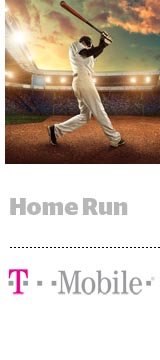 As the Houston Astros and Los Angeles Dodgers gear up for game three of the World Series on Friday, T-Mobile will be eagerly awaiting the game – and watching its Twitter feed.
As the Houston Astros and Los Angeles Dodgers gear up for game three of the World Series on Friday, T-Mobile will be eagerly awaiting the game – and watching its Twitter feed.
The wireless carrier is using Major League Baseball’s postseason to promote its home runs for hurricane relief (#HR4HR) campaign, through which it pledges to donate $20,000 for every home run hit during the games and $2 for every tweet tagged with “#HR4HR.”
The campaign, running across digital, social, broadcast TV and out of home, surpassed T-Mobile’s goal to donate $1 million on Friday, raising $1.6 million from 90 home runs and 250,000 tweets.
“HR4HR is our big above-the-line marketing push,” said Peter DeLuca, SVP of brand communications and acquisition for T-Mobile. “The idea was: What could we do, given that these hurricanes impacted our customers and a lot of the players of MLB?”
Beyond the campaign, T-Mobile continues to embody its “uncarrier” brand, launched almost five years ago, which sets it apart from other mobile carriers by breaking historical consumer barriers of the telecom industry, DeLuca said.
“Ours is a very customer-centric approach,” he said. “We’re trying to put customers first and not require them to do anything to get the benefits of T-Mobile.”
DeLuca spoke with AdExchanger.
AdExchanger: How did you approach the HR4HR campaign from an omnichannel perspective?
PETER DELUCA: We’re leveraging paid digital with a direct challenge to individuals. We guaranteed a million-dollar donation to [hurricane relief organization] Team Rubicon. And we have a campaign on our social and digital channels, MLB.com and broadcast TV. Our CEO, John Ledger, has been very aggressive in promoting this in his own personal channels.
We’re also doing this in all the postseason ballparks and activated it again in the World Series.
You have a program called T-Mobile Tuesdays, which offers prizes and discounts to customers. Is it a loyalty program, and what data can you get from it?
It’s different from a loyalty program. Customers just download the T-Mobile Tuesday app and go to it every Tuesday for rewards. We’re not collecting data from it. It’s unlike the Verizon program where in order to get the rewards you have to opt-in for data tracking.
What’s your programmatic strategy? Do you focus on social platforms or do you buy through the open exchange and PMPs?
We’ve spent approximately a third of our budget on digital, including social, for the past five years. Programmatic is a significant portion of what we do.
We’re not just doing static banners. We go directly to publishers to get large placements and takeover units. We’re using programmatic when we can focus on specific offers.
Your competitors, like Verizon and AT&T, are getting into the media world. What are your ambitions in that space?
Right now, that’s not what we’re looking to do. Our brand is focusing on the customer and delivering an amazing wireless experience. We don’t want to be a content creator or curator.
Your competitors are also moving into ad tech. Will you make similar moves?
I’m not sure what’s on the roadmap for that. I know we’re looking to build ad tech and mar tech capabilities for our own purposes to leverage internally.
What does that mean for your agencies? Are you buying media in house?
We don’t at this point. We’re evaluating everything to figure out the right approach.
It’s always going to be a blended model [with us and our agencies]. We house all of our own customer data and we have access to 100% of all the data from our digital buys.
Telecom is a really competitive space. How do you approach conquesting?
We do conquesting on digital, but on social, you’re not allowed to directly target. We work with [platforms] to create lookalike models. We’ll layer on what we know about our customers and create unique audiences to target individual messages.
It’s going to be interesting to see where this goes as we get our mar tech and ad tech running at a higher-functioning level. We’re going to have better ability to leverage the data we currently have.
This interview has been edited.
This post was syndicated from Ad Exchanger.

More Stories
Is This TikTok Ban, Like, Happening?; DTC Darlings Lose Their Retail Darling
Owen Wilson Does His Best Steve Jobs Impression for a Beauty Startup Ad
Meta’s Ad Business Is Still Surging As Headcount Ticks Upward